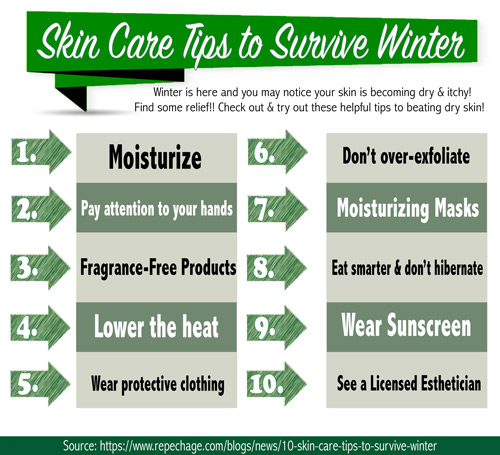Moisturize
Morning and night, after cleansing, toning, and applying your serum, layer on your moisturizer. Although you should be using a moisturizer year-round, it is especially important to not skip this step during the winter months. A moisturizer is necessary to help add moisture into your skin and keep water from evaporating from your skin.
Pay attention to your hands
Always wear gloves when you’re outside and keep a fragrance-free hand cream with you so you can re-apply throughout the day.
Choose fragrance-free products
Although fragrances can make some products smell delicious, they can be irritating if your skin is sensitive.
Lower the heat
High heat not only leads to drier skin, but drier lips, nose and throat. While driving, showering, or spending time indoors, keep the heat at a low setting you are comfortable with and layer on your clothing for warmth. Consider investing in a humidifier which will help replace moisture that is lost in the air.
Wear protective clothing
This includes heavy jackets, a hat, scarf, and gloves. This will help shield your skin from the elements, including wind, which can contribute to dryness.
Don’t over-exfoliate
Don’t skip out on exfoliating altogether during the winter months because you still want to remove dead skin cell build up that can make your skin look flaky.
Use moisturizing treatments
This includes at the spa and at-home. Consider face masks that help moisturize the skin, like an overnight cream mask, or a chocolate face mask that contains cocoa and coconut oil, two ingredients that help make the skin feel soft and smooth.
Eat smarter and don’t hibernate
Although the winter time means sweatshirts and clothing to cover everything up, don’t let that affect your eating or exercise habits. Nutrition, exercise and your skin care routine are all important for maintaining healthy skin.
Wear sunscreen
It doesn’t matter what time of year it is or how cold it is outside. Especially if you like to hit the slopes this time of year, protecting your skin is a must.
See a Licensed Esthetician
If the winter always seems to be a rough time for you and your skin, consider visiting an esthetician. A licensed esthetician can analyze your skin and guide you with the right skincare choices for the winter.
Tips for Glowing Skin in Winter
First, make sure you drink lots of water every day to keep your skin hydrated. Use a thicker moisturizer to help with dry skin, and think about using a humidifier at home to add moisture to the air. Eating healthy foods like fruits, veggies, and good fats can also help your skin look great. And don’t forget to relax with things like yoga or meditation to reduce stress, and get enough sleep each night to keep your skin glowing.
Winter Tips for Oily Skin
During winter, oily skin needs care too! Stay hydrated by drinking plenty of water and use a lightweight, oil-free moisturizer to prevent excess oil production. Exfoliate 2-3 times a week with a gentle chemical exfoliant, and use clay masks once a week to absorb excess oil. Also, manage stress levels, watch your diet, and avoid over-washing to keep your skin balanced and shine-free.
How to Treat Dry Skin in Winter at Home?
Switch to thicker, oil-based creams to moisturize your skin. Use a humidifier to combat dry air and pamper your lips with a nourishing balm. Gentle exfoliation once or twice a week and wise cleansing with fragrance-free products are important. Fuel your body with nutrient-rich foods and manage stress through activities like yoga. Prioritize sleep for skin repair, and try soothing oatmeal baths or honey and avocado masks for added moisture.



Leave a Reply